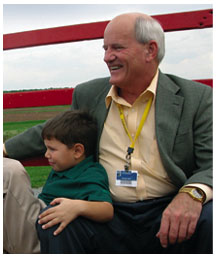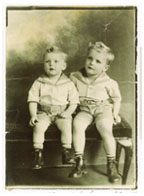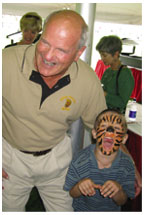February 11, 2004: Features

|
John O’Brien ’65 now leads the school where he was raised as an orphan and learned the tough lessons outside of class.
Above, O’Brien and a second-grader at the Milton Hershey School enjoy a fall hayride on the Hershey campus. (Milton Hershey School)
John O’Brien ’65 as a young boy, left, with his older brother Frankie. Princeton connections abounded at O’Brien’s inaugural celebrations at the Hershey School last fall.
|
Going Home
By Dan White ’65
His earliest childhood memory is a blurred collage of loud, startling noises, a scream, himself lying on a school playground crying, his head bleeding, older kids jeering him, a pair of strong hands reaching down to help him. They are the hands of his “house father” at the Milton Hershey School for orphans in Hershey, Pennsylvania. The boy and his brother, Frankie, are there because their parents have been killed in an automobile crash. It is 1946 and he is three years old; Frankie two years older.
Fifty-six years later, John O’Brien ’65 lives at the Milton Hershey School once again. He has returned triumphant and joyful. After building a career in the corporate world, this fall O’Brien became Hershey’s president at a critical time in its history, and he is guiding the school back to its original mission of educating the neediest children, those other schools don’t want.
O’Brien has traveled a lifetime from his grim start at the Hershey School, though the memories are always close at hand. The O’Brien brothers didn’t know much about their parents’ accident, and questions to relatives elicited only vague answers. Before the tragedy, they lived in Snow Shoe, Pennsylvania, an Appalachian miners’ village of 300 residents and yards junked with worn-out possessions. After the accident, the brothers returned to Snow Shoe two weeks each year, to visit relatives.
The rest of the time, Johnny and Frankie O’Brien roomed together in a cottage of 10 or 12 boys at one of the 40 or so dairy farms owned by the school, founded by chocolate magnate Milton S. Hershey and his wife, Catherine. Unable to have children of their own, the Hersheys established the Hershey Industrial School for orphaned boys in 1909. In 1918, three years after his wife’s death, Milton Hershey gave his entire personal fortune (including what is known today as Hershey Foods) to the school, which continues to provide free education, housing, clothing, meals, health care, counseling, and a free college education anywhere in the United States.
Despite Hershey’s bountiful kindness, there was little tenderness in the school culture during O’Brien’s early days there. In a brutal hazing system, the older boys enslaved the younger ones, ordering them to steal food from the kitchen, do their farm chores, run errands, shine shoes – whatever they commanded. They enforced compliance using such tactics as “blanket parties” behind the barns; a group of older boys would throw a blanket over a victim’s head and “beat the crap out of him,” O’Brien remembers. In those early years, the brothers frequently wrote to their maternal grandmother, begging her to bring them back to Snow Shoe. She would write back that the school was best for them.
Frankie was an easy target for the older boys’ hazing. He was kind, gentle, not at all athletic, nor combative – “too fragile for the fray,” says O’Brien, who was close to him. When he talks about Frankie, his eyes tear and his voice falters. In ninth grade, Frankie began acting strangely, sleeping through classes, then “hooking out” – leaving the house to walk the campus at night. He lost interest in his studies, and in eating. “Watching him get bullied and beaten, then lose his mind and sink . . . it was the worst time in my life,” says O’Brien. The school decided Frankie could not stay, and placed him in a small private psychiatric hospital. Eventually Frankie became a ward of the state. “In the 1970s, I put him in a nice place in Pennsylvania,” says O’Brien, who visited Frankie there for the rest of his life. Frankie died in 1998 “without ever having known a woman, or driven a car, without ever having lived in the real world,” O’Brien says.
Unlike Frankie, John O’Brien was a skilled athlete, competitive and tough, with broad shoulders and a square jaw. One day, early in his hazing ordeal, an older boy ordered him to do an onerous chore, and O’Brien refused. The boy cornered him in the hayloft of a barn, and threw a knife at him. “It stuck in my thigh,” O’Brien remembers. “I charged him with a pitchfork – he fell backwards, out of the loft, and broke his arm.” The hazing ended.
In his senior year, O’Brien captained the football, basketball, and baseball teams, presided over his class and the National Honor Society, sang in the Glee Club, and led a successful student crusade that “busted the bully system.” His German teacher, Bill Fisher, himself a graduate of the Hershey School who would serve as president from 1985 to 1991, remembers that “Johnny did everything, but no matter how many classes he missed because of sports, his completed assignment was always on my desk the next morning. He asked me once, ‘Do you know why I do that? I don’t want to disappoint you.’ He had everything, and everybody including the faculty looked up to him. He was so on fire with enthusiasm.”
O’Brien’s football exploits attracted a number of colleges, including Princeton. Coaches Jake McCandless ’51 and Bob Casciola ’58 visited him one April morning as he was milking cows, his twice-daily chore. “How would you like to join our Princeton family?” they asked. O’Brien choked up. “One thing that you feel the most in an orphanage is a dearth of emotion,” he says. “There’s no sense that you are special.”
With everything he owned packed in a green duffel bag, O’Brien rode to Princeton in the fall of 1961 in a car driven by his girlfriend’s parents. The first Hershey graduate to matriculate at Princeton (the second is a current student), he was amazed at the number of expensive cars that brought his classmates and all their luggage, record players, and possessions. He and Cosmo Iacavazzi ’65, whom he had met that summer in an all-star football game, had decided to room together, beginning a close lifelong friendship. “I would say Johnny was shell-shocked,” recalls Iacavazzi, who had come from Scranton, Pennsylvania, and would become one of Princeton’s greatest football stars. “We used to joke that I came with nothing, and Johnny with less.”
O’Brien says he left Princeton with less self-confidence than he had going in. Debilitating leg injuries limited his football accomplishments. An honor student at Hershey, he had been persuaded by a teacher there to try chemical engineering. Says Iacavazzi, “We’d come out of Physics 103, and it would be clear that Johnny, who wasn’t a complainer, wasn’t getting it. But he wasn’t someone who would accept failure.” Each night, O’Brien went to Dillon Gym Tower and used a key to let himself into the football coaches’ office, where he could study alone and undistracted. Still, he couldn’t grasp engineering and was placed on academic probation after his first semester. “If it hadn’t been for the camaraderie in football, I doubt I would have stayed at Princeton,” O’Brien says of that bleak time. He switched to psychology, and enrolled in a course in criminology.
In a way, it was a natural choice. Not long before, late in his senior year at Hershey, the school ended its part in a conspiracy of silence with O’Brien’s relatives, telling him that his father had not died in a car crash, but was alive. In 1946, Bill O’Brien was a coal miner afflicted with mental illness and an alcohol problem. He had married Dorothy Carlson, a Swede, one of 15 siblings. Living in Snow Shoe with their two sons, the young couple was overwhelmed by Bill’s problems. Dorothy decided to leave her husband, taking her sons with her. When she confronted him, he became enraged. Grabbing a handgun, he shot her dead, then called the police. At age 25, Bill O’Brien was convicted of first-degree murder and sentenced to life in prison at Rockview State Prison.
Hearing this news, John O’Brien was stunned, then excited. He asked to see his father, and the school arranged for a visit to Rockview. When O’Brien first met his father, he felt “an immediate strong connection with him. He looked like me – the same jaw. He’d saved all the news clippings of my athletic career, which one of the prison guards had helped him collect.” After 27 years, his father’s mental health had deteriorated further; he had become fragile. O’Brien wanted to get him out of prison.
With the support of a lawyer, O’Brien read a transcript of the trial and became convinced that his father should have been tried not for first-degree murder but for a crime of passion, even manslaughter. He petitioned the lieutenant governor of Pennsylvania to release him. In 1972, at age 52, O’Brien’s father was released from prison. A friend of O’Brien’s from the Hershey School secured him a job, but he couldn’t work for any length of time and soon retired to a nursing home in Hanover, Pennsylvania, where O’Brien still visits him monthly.
Shortly after graduating from Princeton, O’Brien married and began a family of his own, fathering a son and a daughter. While pursuing a master’s degree in educational psychology at Johns Hopkins, he applied for a teaching position at Hershey, and soon got the job. Overjoyed, he quickly wrote to accept, describing all the changes he would make: better training for houseparents; more independent living experiences for the older students. “While M.H.S. had instilled many good things in me,” O’Brien explains, “it was a highly regimented culture built on zero dissent. You were not allowed to push back, to challenge authority. I wanted to change that.” Back came another, briefer letter from the school: On second thought, it didn’t seem like a good fit. The job offer was rescinded.
After stints in various jobs, including a brief period in Princeton’s admission office and a position exploring “experiential learning” at the National Institute of Education, O’Brien went through a divorce and began to reconsider his career. “I’d been living life as ‘second and short’ – football jargon for easy and safe. I decided to move to ‘third and long,’ where I had thrived as a quarterback at M.H.S. I wanted to get beyond thinking that what I was doing was ‘not bad for an orphan,’ to where I could say, ‘not bad for . . . anyone.’” He conceived of combining his psychology background with experiential learning to make a business: He would take corporate leaders into the outdoors where he would help them learn “to play nicely in the sandbox, to be their authentic selves.”
He pitched the concept to 77 different companies before George Wilder ’39, of Smith Barney, hired him in 1978 to work with new account executives. O’Brien soon was leading corporate leaders around the world: climbing walls, rappeling cliffs, traversing rope courses – all to help develop a sense of team and community, to help people overcome their differences and begin to develop solutions to their organizations’ problems. He remarried, relocated his business to Maryland’s Eastern Shore, and began to get more involved with the Hershey School.
O’Brien’s involvement grew to be larger than he had expected. In November 2002, the president of the school was fired, after more than a decade of increasing hostility with the alumni association; critics believed the president was moving the school away from its historic mission – serving the neediest – toward that of a prep school where academic prowess was the main criterion for admission. As a consultant and as a popular and prominent alumnus, O’Brien had mediated between the embattled forces, though he harbored his own misgivings about the administration. When the president was fired, O’Brien took over as interim president before being chosen to lead for good, six months later. By then, the school had become the largest residential pre-kindergarden-through-12 school in the country, with an endowment close to $6 billion, a sprawling, modern campus, and 1,300 financially and socially disadvantaged students, both boys and girls.
The challenges of this new “third and long” are not lost on O’Brien. Having made a career out of helping other leaders lead, O’Brien now heads a large educational organization with complex problems. Hershey’s enormous resources notwithstanding, it has an alarming college attrition rate: Sixty percent of its graduates drop out of college. O’Brien feels the school needs to refocus on its mission of serving the most disadvantaged students: the neediest and most alone in America.
“M.H.S. gave me a compassion for those dealt a measly hand,” he says. “We have 300 kids here now who desperately need M.H.S., and 1,000 who don’t. I want to expand the student body to 1,800 of the right kids. I want to help them build really strong characters, and then” – sounding a major theme of his life – “help them overcome their fear of being vulnerable even as they learn self-reliance.”
Judging by the fanfare at his inauguration in September, O’Brien
has generated much hope and excitement. When the procession with the new
president came into the auditorium, the school orchestra struck up “When
Johnny Comes Marching Home Again.” A score of Princetonians in the
audience, led by Iacavazzi in an orange and black striped reunion blazer,
rose to give him a locomotive. It was not bad for . . . anyone. ![]()
Dan White ’65, a former director of the Alumni Council and occasional PAW contributor, is a consultant in alumni relations.




